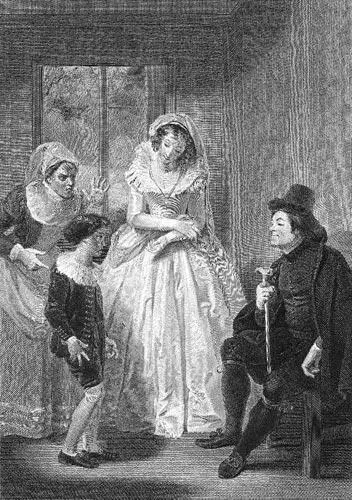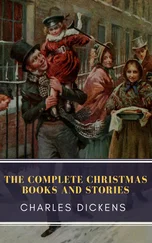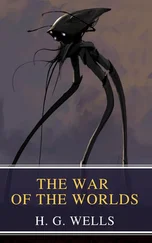Will. A stone.
Evans. And what is ‘a stone,’ William?
Will. A pebble.
Evans. No; it is lapis. I pray you remember in your prain.
Will. Lapis.
Evans. That is a good William. What is he, William, that does lend articles?
Will. Articles are borrow’d of the pronoun, and be thus declin’d, Singulariter, nominativo, hic, haec, hoc.
Evans. Nominativo, hig, hag, hog; pray you mark; genitivo, hujus. Well, what is your accusative case?
Will. Accusativo, hinc.
Evans. I pray you have your remembrance, child. Accusativo, [hung], hang, hog.
Quick. ‘Hang-hog’ is Latin for bacon, I warrant you.
Evans. Leave your prabbles, oman. What is the focative case, William?
Will. O—vocativo, O.
Evans. Remember, William, focative is caret.
Quick. And that’s a good root.
Evans. Oman, forbear.
Mrs. Page. Peace!
Evans. What is your genitive case plural, William?
Will. Genitive case?
Evans. Ay.
Will. [Genitivo,] horum, harum, horum.
Quick. Vengeance of Jinny’s case! Fie on her! never name her, child, if she be a whore.
Evans. For shame, oman.
Quick. You do ill to teach the child such words. He teaches him to ‘hic’ and to ‘hac,’ which they’ll do fast enough of themselves, and to call ‘horum,’—fie upon you!
Evans. Oman, art thou [lunatics]? Hast thou no understandings for thy cases and the numbers of the genders? Thou art as foolish Christian creatures as I would desires.
Mrs. Page. Prithee hold thy peace.
Evans. Show me now, William, some declensions of your pronouns.
Will. Forsooth, I have forgot.
Evans. It is qui, [quae], quod: if you forget your qui’s, your [quae’s], and your quod’s, you must be preeches. Go your ways and play, go.
Mrs. Page. He is a better scholar than I thought he was.
Evans. He is a good sprag memory. Farewell, Mistress Page.
Mrs. Page. Adieu, good Sir Hugh. [Exit Evans.] Get you home, boy. Come, we stay too long.
Exeunt.
¶
 Robert Smirke , p. — Thomas Holloway , e.
Robert Smirke , p. — Thomas Holloway , e.
Enter Falstaff, Mistress Ford.
Fal. Mistress Ford, your sorrow hath eaten up my sufferance. I see you are obsequious in your love, and I profess requital to a hair’s breadth, not only, Mistress Ford, in the simple office of love, but in all the accoustrement, complement, and ceremony of it. But are you sure of your husband now?
Mrs. Ford. He’s a-birding, sweet Sir John.
Mrs. Page [Within.] What ho, gossip Ford! What ho!
Mrs. Ford. Step into th’ chamber, Sir John.
[Exit Falstaff.]
[Enter] Mistress Page.
Mrs. Page. How now, sweet heart, who’s at home besides yourself?
Mrs. Ford. Why, none but mine own people.
Mrs. Page. Indeed?
Mrs. Ford. No, certainly. [Aside to her.] Speak louder.
Mrs. Page. Truly, I am so glad you have nobody here.
Mrs. Ford. Why?
Mrs. Page. Why, woman, your husband is in his old lines again. He so takes on yonder with my husband; so rails against all married mankind; so curses all Eve’s daughters, of what complexion soever; and so buffets himself on the forehead, crying, “Peer out, peer out!”, that any madness I ever yet beheld seem’d but tameness, civility, and patience to this his distemper he is in now. I am glad the fat knight is not here.
Mrs. Ford. Why, does he talk of him?
Mrs. Page. Of none but him, and swears he was carried out, the last time he search’d for him, in a basket; protests to my husband he is now here, and hath drawn him and the rest of their company from their sport, to make another experiment of his suspicion. But I am glad the knight is not here. Now he shall see his own foolery.
Mrs. Ford. How near is he, Mistress Page?
Mrs. Page. Hard by, at street end; he will be here anon.
Mrs. Ford. I am undone! the knight is here.
Mrs. Page. Why then you are utterly sham’d, and he’s but a dead man. What a woman are you? Away with him, away with him! Better shame than murther.
Mrs. Ford. Which way should he go? How should I bestow him? Shall I put him into the basket again?
[Enter Falstaff.]
Fal. No, I’ll come no more i’ th’ basket. May I not go out ere he come?
Mrs. Page. Alas! three of Master Ford’s brothers watch the door with pistols, that none shall issue out; otherwise you might slip away ere he came. But what make you here?
Fal. What shall I do? I’ll creep up into the chimney.
Mrs. Ford. There they always use to discharge their birding-pieces. Creep into the kill-hole.
Fal. Where is it?
Mrs. Ford. He will seek there, on my word. Neither press, coffer, chest, trunk, well, vault, but he hath an abstract for the remembrance of such places, and goes to them by his note. There is no hiding you in the house.
Fal. I’ll go out then.
[Mrs. Page]. If you go out in your own semblance, you die, Sir John—unless you go out disguis’d.
Mrs. Ford. How might we disguise him?
Mrs. Page. Alas the day, I know not! There is no woman’s gown big enough for him; otherwise he might put on a hat, a muffler, and a kerchief, and so escape.
Fal. Good hearts, devise something; any extremity rather than a mischief.
Mrs. Ford. My maid’s aunt, the fat woman of Brainford, has a gown above.
Mrs. Page. On my word, it will serve him; she’s as big as he is. And there’s her thrumm’d hat and her muffler too. Run up, Sir John.
Mrs. Ford. Go, go, sweet Sir John. Mistress Page and I will look some linen for your head.
Mrs. Page. Quick, quick! we’ll come dress you straight. Put on the gown the while.
[Exit Falstaff.]
Mrs. Ford. I would my husband would meet him in this shape. He cannot abide the old woman of Brainford. He swears she’s a witch, forbade her my house, and hath threat’ned to beat her.
Mrs. Page. Heaven guide him to thy husband’s cudgel; and the devil guide his cudgel afterwards!
Mrs. Ford. But is my husband coming?
Mrs. Page. Ay, in good sadness, is he, and talks of the basket too, howsoever he hath had intelligence.
Mrs. Ford. We’ll try that; for I’ll appoint my men to carry the basket again, to meet him at the door with it, as they did last time.
Mrs. Page. Nay, but he’ll be here presently. Let’s go dress him like the witch of Brainford.
Mrs. Ford. I’ll first direct my men what they shall do with the basket. Go up, I’ll bring linen for him straight.
[Exit.]
Mrs. Page.
Hang him, dishonest varlet! we cannot misuse [him] enough.
We’ll leave a proof, by that which we will do,
Wives may be merry, and yet honest too:
We do not act that often jest and laugh;
’Tis old, but true: still swine eats all the draff.
[Exit.]
[Enter Mistress Ford with two] Servants.
Mrs. Ford. Go, sirs, take the basket again on your shoulders. Your master is hard at door. If he bid you set it down, obey him. Quickly, dispatch.
Читать дальше

 Robert Smirke , p. — Thomas Holloway , e.
Robert Smirke , p. — Thomas Holloway , e.










![Уильям Шекспир - The Works of William Shakespeare [Cambridge Edition] [Vol. 1 of 9]](/books/746589/uilyam-shekspir-the-works-of-william-shakespeare-c-thumb.webp)